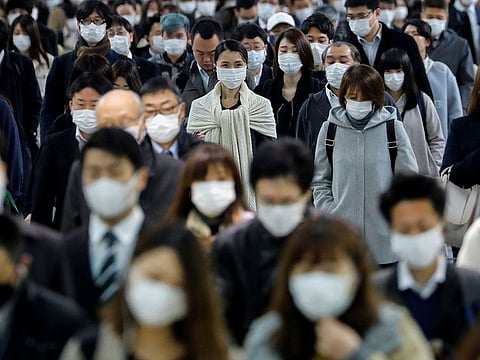COVID-19: Natural world could be the winner in this war
Most of us must steel ourselves for more of the same in the months or years to come

Stuck inside my home in Egypt in between railing at the sun’s rays for bathing my neighbour’s terrace while skirting the edge of my balcony, my mind keeps wandering back to my early childhood in Wales where I lived with my parents in a whitewashed two-up, two-down cottage.
Our home was simple, to put it mildly, but at the end of the garden was my childhood playground, a mountain that in summer became a glorious canvas of heather, daisies and buttercups as well as all kinds of wild berries which I faithfully gathered to be used to make tarts and pies.
Summer was the time for chasing butterflies, fishing for minnows and going for long walks with my dog. My commune with nature ended abruptly when we moved to an area of London which could hardly be described as leafy.
Question is will this terrible plague be a wake-up call for governments everywhere, firstly to band together to stop all trade in wildlife so that the risk of future pandemics can be minimised but, most importantly to realise that humans must no longer be allowed to ride roughshod over nature
Nature and I abruptly parted company and as I adjusted to life in the rat race I no longer remembered the scent of orange and apple blossom or newly cut grass. That is until now when Covid-19 restrictions have turned beaches and parks into no-go areas. I am guilty — guilty of taking nature’s bounteous gifts for granted and I suspect that I am not alone.
There is no minimising the fact that this planet-wide pandemic has caused untold misery to humankind. People everywhere have been robbed of those they love, parents, grandparents, spouses, children and friends.
Fears about future
Fears about the future, joblessness and confinement are fertile ground for domestic abuse, divorce, depression and even suicide. In the US, queues outside food banks are lengthening. Many of us miss human interaction. Most of us must steel ourselves for more of the same in the months or years to come.
The only one left laughing is Mother Nature.
Also Read: A powerful sign this Earth Day
Also Read: COVID-19: How nature is reclaiming my city
Residents of cities such as Bengaluru and Delhi that held the dubious ranking of being the world’s most polluted city can breathe in clean air for the first time in years if not decades since the lockdown emptied the streets of vehicles. Plus the annoying cacophony of car horns has been replaced by the sweet sound of bird song.
Indians living in the state of Punjab were excited to see the majestic snow-capped Himalayas for the first time in over 30 years. Areas of the once murky Ganges River which Hindus consider to be holy and others are now fit for bathing. This has to be great news for India that suffers the highest pollution-related deaths worldwide.
As reported by The Guardian “toxic megacities such as Bangkok, Beijing, Sao Paulo and Bogota, where varying coronavirus restrictions have been imposed, all reported an unprecedented decline in pollution”. Skies that are normally grey have turned blue almost everywhere.
Amazingly, the ozone layer that protects us from harmful radiation is repairing itself. The European Commission’s Copernicus satellite program has discovered that the largest hole in the ozone layer has closed itself up.
While many of us can only enjoy this new brighter, cleaner world from our windows, wildlife is being rewarded after decades of humans encroaching on life-supporting habitats. Foxes are making themselves at home in British gardens.
Wild boars have invaded streets in Barcelona and a herd of wild Kashmiri goats are nibbling flowers in a Welsh seaside town. Dolphins can be seen frolicking in the Bosphorus and the previously filthy Venice canals. Cougars have been wandering the streets of Santiago, Chile.
Sentient beings
The question is will this terrible plague be a wake-up call for governments everywhere, firstly to band together to stop all trade in wildlife so that the risk of future pandemics can be minimised but, most importantly to realise that humans must no longer be allowed to ride roughshod over nature and recognise that animals are sentient beings with an important role in the ecosystems.
Now we can see with our own eyes how our forced retreat is making our planet whole again. Will we say adieu to these gorgeous blue skies and the chance to fill our lungs with fresh air in order to jump back into our petrol or diesel vehicles or will we embrace electric?
Will we permit factories to spew greenhouse gases into the atmosphere or dump toxic chemicals into our waterways? Or will we selfishly resume our old damaging habits as soon as the handcuffs come off?
I will leave you with a powerful message from Jane Goodall, an anthropologist famed for her study of chimpanzees, who blames humans for abusing nature and wildlife which she believes is responsible for creating Covid-19.
“It is because we disregard our place in the natural world and we disrespect the environment and animals that Covid-19 happened, she says and I, for one, suspect she might be right.
— Linda S. Heard is an award-winning British political columnist and guest television commentator with a focus on the Middle East
Sign up for the Daily Briefing
Get the latest news and updates straight to your inbox






